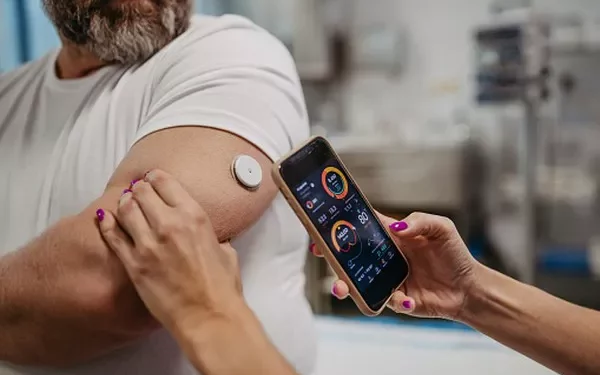Abbott has officially launched its prescription-free continuous glucose monitor, Lingo, marking a significant step into the general wellness market. Cleared by the US Food and Drug Administration (FDA), this device is now available for purchase in the US, providing non-diabetics with the opportunity to monitor blood sugar levels. This move follows a recent release by Dexcom, another leader in diabetes technology, which introduced its own consumer-friendly glucose monitor, Stelo. Here’s a breakdown of the latest developments in blood sugar monitoring.
Expanding the Market: From Diabetes to Wellness
Glucose monitoring has long been a staple for individuals managing diabetes, but now, it is entering the general wellness sphere. Abbott’s Lingo aims to offer people without diabetes insights into how their diet and daily habits affect their blood sugar. Priced starting at $49 for a two-week sensor, Lingo allows consumers to track blood sugar without needing insulin. Available previously in the UK, it now reaches the US market, with users able to pay using Flexible Spending Accounts (FSA) or Health Savings Accounts (HSA).
Last month, Dexcom introduced Stelo, a continuous glucose monitor designed for those with Type 2 diabetes who do not need insulin. Stelo also targets non-diabetic consumers looking for greater insight into their metabolic health. Priced at $99 for a one-month supply, it similarly allows for FSA or HSA purchases.
Blood Sugar: A Window Into Metabolic Health
Though essential for individuals with diabetes, blood sugar regulation is fundamental to everyone’s metabolism. Blood sugar serves as the body’s primary source of energy, and fluctuations can be linked to metabolic health—a term broadly referring to how well the body processes energy. Abbott’s Lingo and Dexcom’s Stelo both cater to consumers interested in biohacking and personalized health trends. However, achieving consistent, accurate readings of glucose and defining “metabolic health” remain complex challenges. Factors such as diet, exercise, and even stress all influence glucose levels, making it difficult to pinpoint what constitutes optimal metabolic health.
While fitness trackers and smartwatches have revolutionized personal health monitoring, none can measure blood glucose levels. This technological limitation leaves diabetes tech companies like Abbott and Dexcom as the primary players in this field. Both firms have adapted their highly successful diabetes technologies—Abbott’s FreeStyle Libre and Dexcom’s G6 and G7 sensors—to appeal to the broader market interested in tracking metabolic health.
Who Should Consider These Devices?
The question remains: who benefits from over-the-counter glucose monitors? Dexcom’s Stelo and Abbott’s Lingo target consumers with Type 2 diabetes, prediabetes, or anyone seeking to understand the impact of diet and exercise on their blood sugar levels. These devices, worn on the back of the arm, feature small sensors inserted just under the skin to provide real-time data via a companion app. For some, this technology represents a proactive approach to understanding their metabolic health.
However, the cost and accessibility of these devices raise concerns. Continuous glucose monitors can cost thousands of dollars annually, and without insurance coverage, they remain out of reach for many. According to Dr. Robert H. Shmerling from Harvard Health Publishing, companies marketing these products to the general public stand to make significant profits from an area of health where research is still emerging. Abbott cites studies that only 12% of Americans are “metabolically healthy,” but glucose levels are just one of many factors.
With one-third of Americans affected by prediabetes, there is growing interest in tools that provide actionable health insights. However, without insurance, non-prescription monitors such as Lingo and Stelo may remain financially inaccessible for many, despite their potential benefits in helping to prevent Type 2 diabetes.
The Push for Non-Invasive Monitoring
The interest in non-invasive glucose tracking is growing, with companies like Know Labs developing innovative alternatives. Know Labs showcased promising developments in blood sugar tracking at the American Diabetes Association conference earlier this year. Their prototype device, KnowU, aims to measure blood sugar without penetrating the skin, using photonics technology. Although still in development, this non-invasive device represents a step forward in consumer-friendly blood sugar monitoring.
While KnowU is bulkier than existing glucose monitors like Lingo and Stelo, it could revolutionize the market by eliminating the need for even minimally invasive sensors. Know Labs CEO Ron Erickson envisions a future where glucose tracking feeds directly into wearable health trends. Erickson’s “form-factor agnostic” approach suggests that the technology could integrate with smartwatches or other wearables, potentially democratizing access to health insights beyond glucose levels.
Looking Ahead: The Future of Health Monitoring
As consumer health tech evolves, glucose monitoring is becoming a key player in the broader wellness market. Abbott and Dexcom are paving the way, but with emerging competitors like Know Labs, the landscape of metabolic health tracking is poised for rapid transformation. Although consumer CGMs offer insights into how lifestyle impacts blood sugar, questions about cost, accessibility, and necessity remain.
For now, Abbott’s Lingo and Dexcom’s Stelo represent the forefront of this new health frontier—offering non-diabetics the tools to take greater control of their wellness journey. However, the full impact of these devices on public health is yet to be determined.
Related topics:
New Study: Weight Loss Drug Zepbound Significantly Reduces Diabetes Risk
Top 3 Habits to Prevent Cognitive Decline in Diabetics: New Study Insights
Dark Chocolate May Reduce Risks of Diabetes and Obesity, Study Finds

























